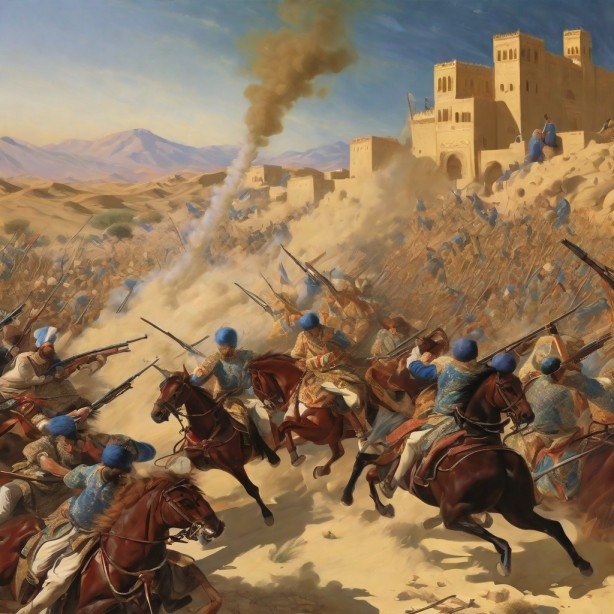
Navigating Iran Nuclear Deal News: Past, Present, and Future Uncertainties
Jan 4, 2024
Intro: The Prospects of the Iran Nuclear Deal in 2024
As we enter 2024, the world finds itself at a critical juncture. The Iran nuclear deal, officially known as the Joint Comprehensive Plan of Action (JCPOA), stands on a precipice, its future shrouded in uncertainty. This landmark agreement, a cornerstone of global nuclear diplomacy, now faces many challenges that could determine its survival in the years to come.
The JCPOA, born out of intense negotiations and diplomatic efforts, has been a beacon of hope for nuclear non-proliferation. However, the shifting geopolitical landscape, marked by escalating tensions and changing alliances, has shadowed its future. The increasingly aggressive behaviours of global powers, coupled with the turbulent political climate in the Middle East, have added complexity to the situation.
The past year has seen a resurgence of conflict in the region, with the invasion of Ukraine and the Israel-Hamas conflict of October 2023 serving as stark reminders of the fragile peace that exists. Amidst this backdrop, the JCPOA finds itself in a precarious position, its fate intertwined with the unfolding geopolitical drama.
The role of Iran in the Middle East has been a subject of intense scrutiny. Tehran’s policies, particularly its support for allies like Hizbollah and its ballistic missile program, have been contentious issues that have influenced the dynamics of the JCPOA. The U.S., despite its military defeat of ISIS, has yet to withdraw its forces, citing concerns about a premature departure enabling ISIS to return and Iran to expand its malign influence throughout the region.
As we look towards the future, the survival of the JCPOA will be determined by a complex interplay of factors. The democratization process in Iran, spurred by economic growth and pressure from below, could potentially influence the trajectory of the nuclear deal. On the other hand, the strategic posture of global powers, particularly the U.S. and its regional partners, will also play a crucial role. The U.S. has been working to bolster the security of its regional partners against potential Iranian threats, focusing on maritime security and air and missile defence.
The Current State of the JCPOA
The Joint Comprehensive Plan of Action (JCPOA), a landmark agreement aimed at curbing Iran’s nuclear ambitions, has been in flux since the United States’ withdrawal in 2018 under the Trump administration. This decision marked a significant turning point in the trajectory of the deal, leading to a series of events that have left the JCPOA hanging in the balance.
The U.S. withdrawal from the JCPOA accompanied the re-imposition of heavy economic sanctions on Iran. These sanctions, which targeted key sectors of Iran’s economy, including oil, banking, and shipping, had a profound impact on Iran’s economy. The country’s oil exports, a critical source of revenue, plummeted, and its currency, the rial, lost significant value. The economic hardship caused by these sanctions led to widespread protests in Iran, further destabilizing the country.
In response to the U.S. withdrawal and the re-imposition of sanctions, Iran gradually abandoned many of the deal’s restrictions. This move was seen as a strategic attempt by Iran to pressure the remaining parties to the agreement – the UK, France, Germany, Russia, and China – to provide economic relief from U.S. sanctions. However, these efforts have been mainly unsuccessful, and the financial situation in Iran remains dire.
As of now, Iran has significantly advanced its nuclear program beyond the limits set by the JCPOA. The International Atomic Energy Agency (IAEA), the UN body responsible for monitoring Iran’s compliance with the deal, has confirmed this development. According to the IAEA, Iran has increased its uranium enrichment levels and its stockpile of enriched uranium, both of which violate the JCPOA. The country has also resumed activities at key nuclear facilities and has hindered the IAEA’s monitoring and verification activities.
The advancement of Iran’s nuclear program has raised alarm bells in the international community. The fear is that Iran could shorten its “breakout time” – the time it would take to produce enough fissile material for a nuclear weapon if it chose to do so. This development has added urgency to the ongoing efforts to revive the JCPOA.
The Biden Administration’s Approach
When President Joe Biden assumed office in 2021, he inherited a complex and challenging situation with the Iran nuclear deal. The previous administration’s withdrawal from the JCPOA and the re-imposition of sanctions had led to an escalation in tensions and a significant advancement in Iran’s nuclear program. Recognizing the importance of the JCPOA for regional stability and nuclear non-proliferation, President Biden signalled his intention to return to the deal. However, he insisted that Iran must first reverse its nuclear advancements, a condition that has proven to be a central sticking point in negotiations.
Iran, on the other hand, demanded that the U.S. lift sanctions before it would take any steps to roll back its nuclear program. This demand stems from the severe economic hardship that Iran has faced as a result of the sanctions, which have crippled its economy and led to widespread protests. The stalemate between the U.S. and Iran has thus continued, with neither side showing signs of backing down.
Throughout his presidency, Biden has consistently conveyed his intent to rejoin the JCPOA. His administration has engaged in multiple indirect talks with Iran in Vienna, aiming to find a diplomatic solution to the impasse. However, these talks have been fraught with difficulties and have not yielded a breakthrough.
In addition to the negotiations, the Biden administration has also been working on a broader strategy to address the challenges posed by Iran. This includes bolstering the security of U.S. regional partners against potential Iranian threats and working to de-escalate tensions in the Middle East. The administration has also been preparing various options in case the diplomatic efforts to revive the JCPOA fail.
Despite these efforts, the future of the JCPOA remains uncertain. The Biden administration’s approach, while aimed at restoring the deal and its non-proliferation benefits, has been met with resistance from Iran. The ongoing stalemate, coupled with the advancements in Iran’s nuclear program, has added a sense of urgency to the situation. As we move into 2024, the Biden administration’s approach to the JCPOA will continue to be a critical factor in determining the deal’s future.
The European Union’s Role
The European Union (EU) has been a pivotal player in the unfolding saga of the Iran nuclear deal. Despite the U.S. withdrawal from the JCPOA in 2018, the EU, China, and Russia have remained committed to the agreement, working tirelessly to keep it alive. This commitment reflects the EU’s broader strategy of upholding multilateral agreements and promoting nuclear non-proliferation.
The EU’s efforts to preserve the JCPOA have been multifaceted. On the diplomatic front, the EU has played a crucial role in facilitating negotiations between Iran and the remaining parties to the deal. The EU’s High Representative for Foreign Affairs and Security Policy has acted as the coordinator for these talks, which have taken place in Vienna. These negotiations have aimed to find a way for the U.S. to rejoin the deal and for Iran to return to compliance.
However, U.S. sanctions have significantly hampered the EU’s efforts to keep the JCPOA alive. These sanctions have targeted Iran and third parties that engage in certain types of business with Iran. As a result, European companies have been deterred from doing business with Iran due to fear of U.S. penalties. This has made it difficult for the EU to deliver on its commitments under the JCPOA, particularly those related to providing economic relief to Iran.
In response to this challenge, the EU, the UK, France, and Germany established a special-purpose vehicle called INSTEX (Instrument in Support of Trade Exchanges) in 2019. INSTEX was designed to facilitate legitimate trade between Europe and Iran without violating U.S. sanctions. However, the mechanism has faced numerous challenges and has not been able to fully offset the impact of U.S. sanctions on Iran’s economy.
The Regional Dynamics
The JCPOA’s future is shaped by the signatories’ actions and significantly influenced by the broader regional dynamics in the Middle East. The region is characterized by a complex web of rivalries, alliances, and conflicts, all of which play a crucial role in the Iran nuclear deal saga.
Iran’s regional rivals, notably Israel and Saudi Arabia, have long opposed the JCPOA. These countries view Iran as a significant threat to their security and regional stability. They fear that lifting sanctions would empower Iran, providing it with the resources to increase its regional influence and support for proxy groups in various Middle Eastern countries.
Israel, in particular, sees Iran’s nuclear program as an existential threat. The country has been vocal in its opposition to the JCPOA, arguing that the deal does not go far enough in curbing Iran’s nuclear ambitions. The recent conflicts in the region, including the Israel-Hamas conflict of October 2023, have further heightened these concerns.
Saudi Arabia, on the other hand, has been engaged in a long-standing rivalry with Iran, with both countries vying for regional dominance. The two countries have been on opposite sides of several conflicts in the region, including the wars in Yemen and Syria. Saudi Arabia fears that a resurgent Iran, bolstered by the lifting of sanctions, could tip the regional balance of power in its favour.
The regional dynamics are further complicated by the ongoing civil wars in Syria and Yemen, which have become arenas for proxy warfare between Iran and its rivals. These conflicts have not only caused immense human suffering but have also contributed to regional instability.
Conclusion: The Prospects in 2024
In forecasting the fate of the Joint Comprehensive Plan of Action (JCPOA), commonly known as the Iran nuclear deal, in 2024, we confront the intricacies of a dynamic international political landscape. The outcome hinges on pivotal factors:
The domestic political atmosphere in both the U.S. and Iran plays a decisive role. The 2022 midterm elections in the U.S. reshaped Congress’s power dynamics, influencing President Biden’s negotiation capabilities. Simultaneously, the election of a hardline president in Iran adds complexity, shaping the nation’s stance and compliance with the JCPOA.
The indispensable role of the international community, comprising the European Union (EU), China, and Russia, stands out. Their staunch support for the deal positions them to pressure the U.S. and Iran. Success, however, hinges on adept navigation of the complex geopolitical landscape and harmonizing diverse interests.
Ongoing conflicts in Yemen, Syria, and the Israel-Palestine issue intertwine with the JCPOA’s fate. The resolution or escalation of these conflicts ripples into broader U.S.-Iran relations, indirectly shaping the deal’s destiny.
Economic implications are a critical facet. The potential financial gains for Iran following the sanctions’ removal serve as a compelling incentive to return to compliance, underscoring the deal’s economic significance.
In conclusion, while the future of the Iran nuclear deal remains uncertain, the stakes for regional and global security are high. The deal’s survival in 2024 will require adept diplomacy, political will, and a shared commitment to peace and stability from all parties involved.
Journey to Unexplored Insights
The Big Picture: Lower oil & energy prices
Crude oil price projections: will oil prices stabilize
For Many Americans Great Recession Never Ended
Belt & Road Initiative: Taking China’s culture beyond borders
EU stands to benefit by Granting China free market status
China cuts rates to boost green energy demand

China showcases its culture to the World
Remaking Moscow lures more Chinese investment
Chinese firms extend Moscow’s rail networks
Russians show patriotism on nuclear bunker tours
Moscow hi-tech parks seek lower production costs
Despite challenges & sanctions: Russian oil & gas remain profitable
Downed Su-24 shows U.S treachery
Global Warming Is Fake: Let’s See If This is True
Psychological Manipulation Tactics: Your Recognition & Defense Guide


